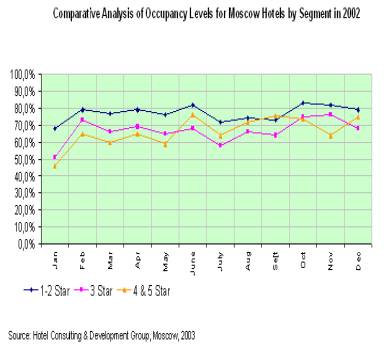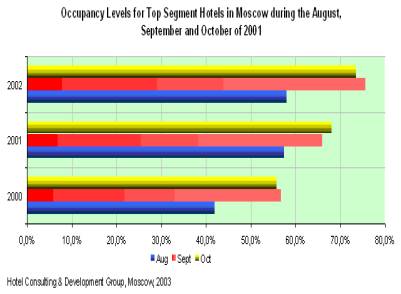2003-05-23
Moscow Hotel Market and Terrorism
If one a half year ago terrorism attacks in
the USA have stressed the economic vulnerability of hotel markets across the
world, this year’s concern for hotel business was the outcome of the US-British
involvement in Irak. During the
conflict, Russia has remained on the sidelines of world events. The incidents
with regard to the hostage crisis last October did more harm to the image of
Moscow as a safe leisure destination, the impact on Moscow hotel performance
was however minor.
The January occupancy in 2003 of top segment
Moscow hotels remained practically at the same level as the previous year. The
recorded change was approx +0.14 points. The mid-tier hotels performed even a
little better than the previous year at 52.7% in comparison to 51% in
2002. The drop in demand in Moscow city
hotels between end of December and mid-January is due to the fact that during
the national holidays, most hotel guests are visiting friends and relatives.
The corporate segment represents 60% of total hotel demand for Moscow city
hotels. The recession of business activity is
reflected in the market as a whole and on performance indicators of hotel
activity.
 
While hotels in Moscow had not
suffered from panic caused by international terrorism attacks in world cities
outside Russia, the market is much more sensitive to national problems.
Evidence of the latter includes the Rouble crisis in 1998, or the attempted
political coup in 1991. More currently, the hostage crisis may have drawn world
attention for a few weeks until the intervention of Russian government security
forces put an end to the crisis. Though there were many victims to the gas used
in the intervention. This negative image conveyed by media reporting during
hostage crisis resulted in cancelled bookings at hotels catering heavily to
international leisure travellers, lesser so to corporate travellers.
If, for example, in London after September
11th attacks in USA average hotel occupancy sank in the fourth quarter by 12,1
% in comparison with the 4th quarter average occupancy in 2002, 4
and 5 star hotels in Moscow were relatively unaffected by these global events.
In fact, recorded occupancy was 11% to 15% higher than in 2001, which has still
bore the impact of the 1998 financial crisis. One of the hotels most affected
by the September 11th terrorist attacks, for example, was the Le
Meridien National, which disclosed to the press, that because of terrorism
attacks of September 11th, 2001, the hotel lost approx. $500.000 in
pre-booked sales revenues that had been cancelled during or following the
terrorist attacks.
However losses reported losses in Moscow
hotels in September, 2001 were more " «virtual", since these losses
were merely based on projected rather than on achieved revenues. But even these
indicators were better than comparative results achieved by 4 & 5 star
hotels achieved a year ago. The rouble crisis carried a serious backlash to the
customary demand of top segment hotels catering to large foreign companies. The
financial crisis brought a loss of confidence from foreign representative
offices in Moscow and damaged local purchasing power. As a result, luxury
hotels had lost their clientele and only recovered around 2001. 1999 was an
austere year for most and though the economy was recovering, revived confidence
was slow to follow. The hotels positioned in the mid-tier and budget category
equally survived through these hard times, some better than others.
Nonetheless, during this time, the demand shifted to less expensive hotels,
particularly for expense-wary companies. The loss in purchasing power forced
domestic companies to seek less expensive accommodation alternatives, which
kindled a reorientation in demand for mid and budget category hotels.
In general, it can be concluded from our
observations, that most of the negative impact on hotel performance on the
macro level is caused by internal problems, which are either economical or
political in nature, rather than on world events far from home.
|




